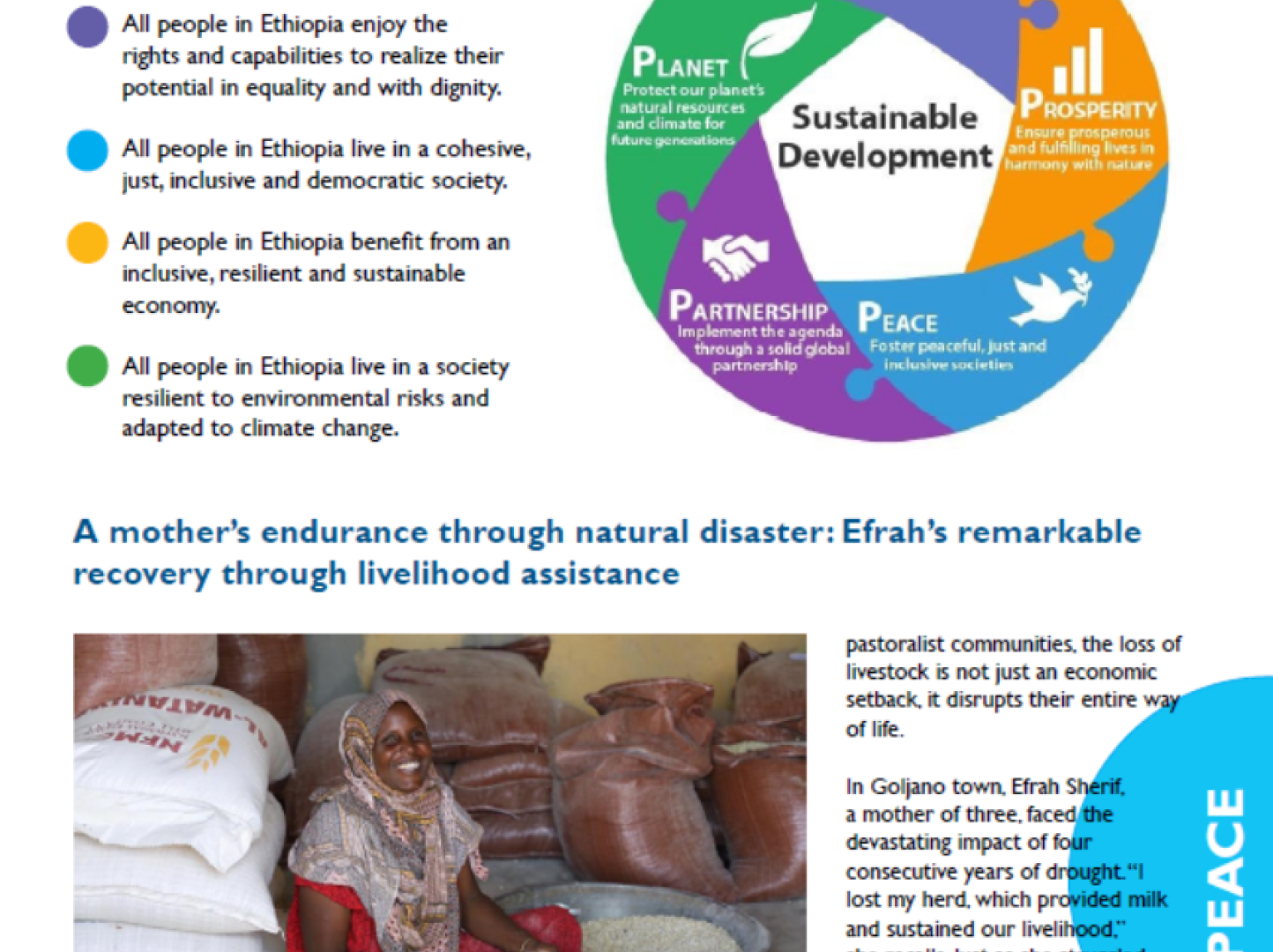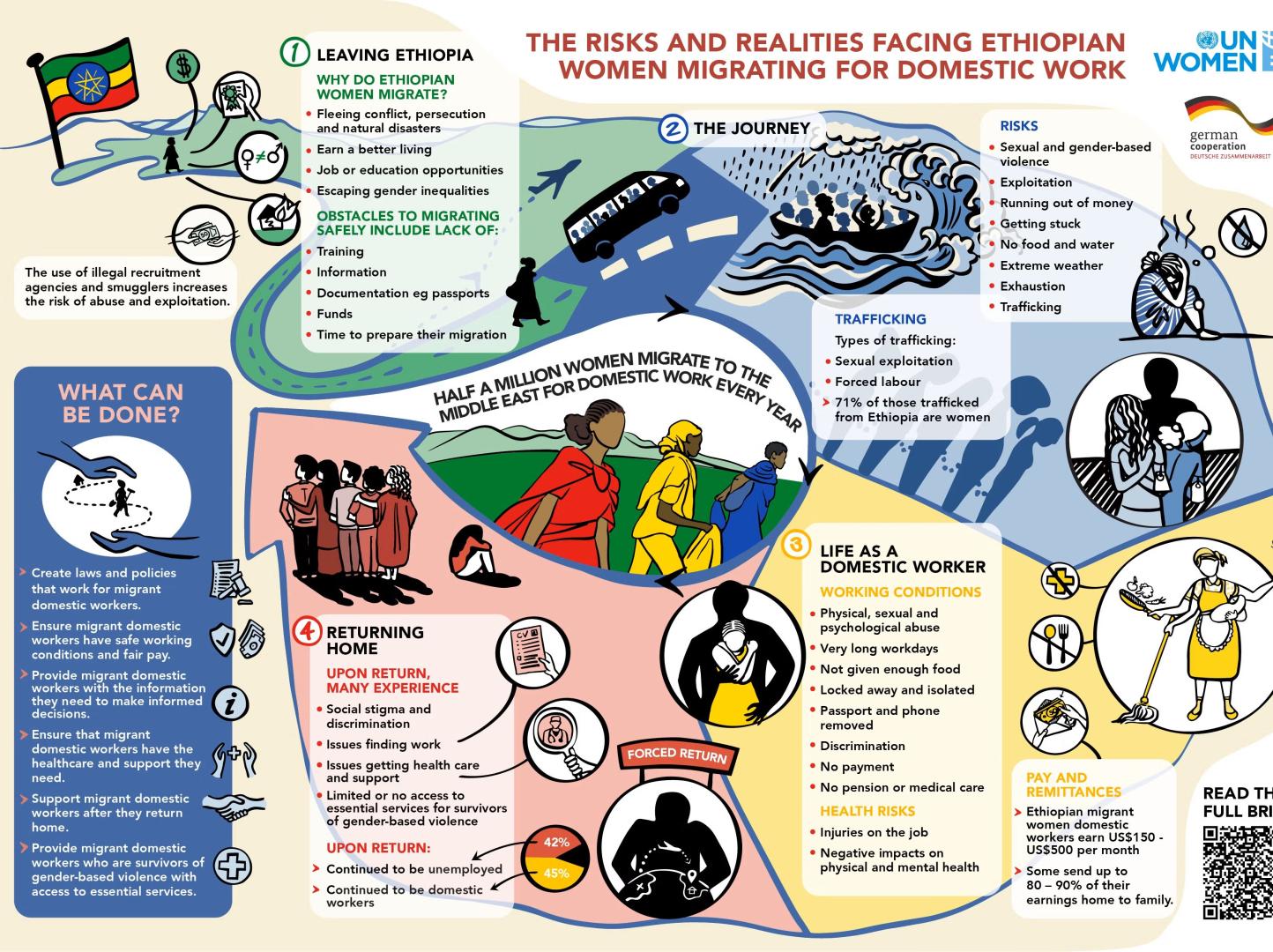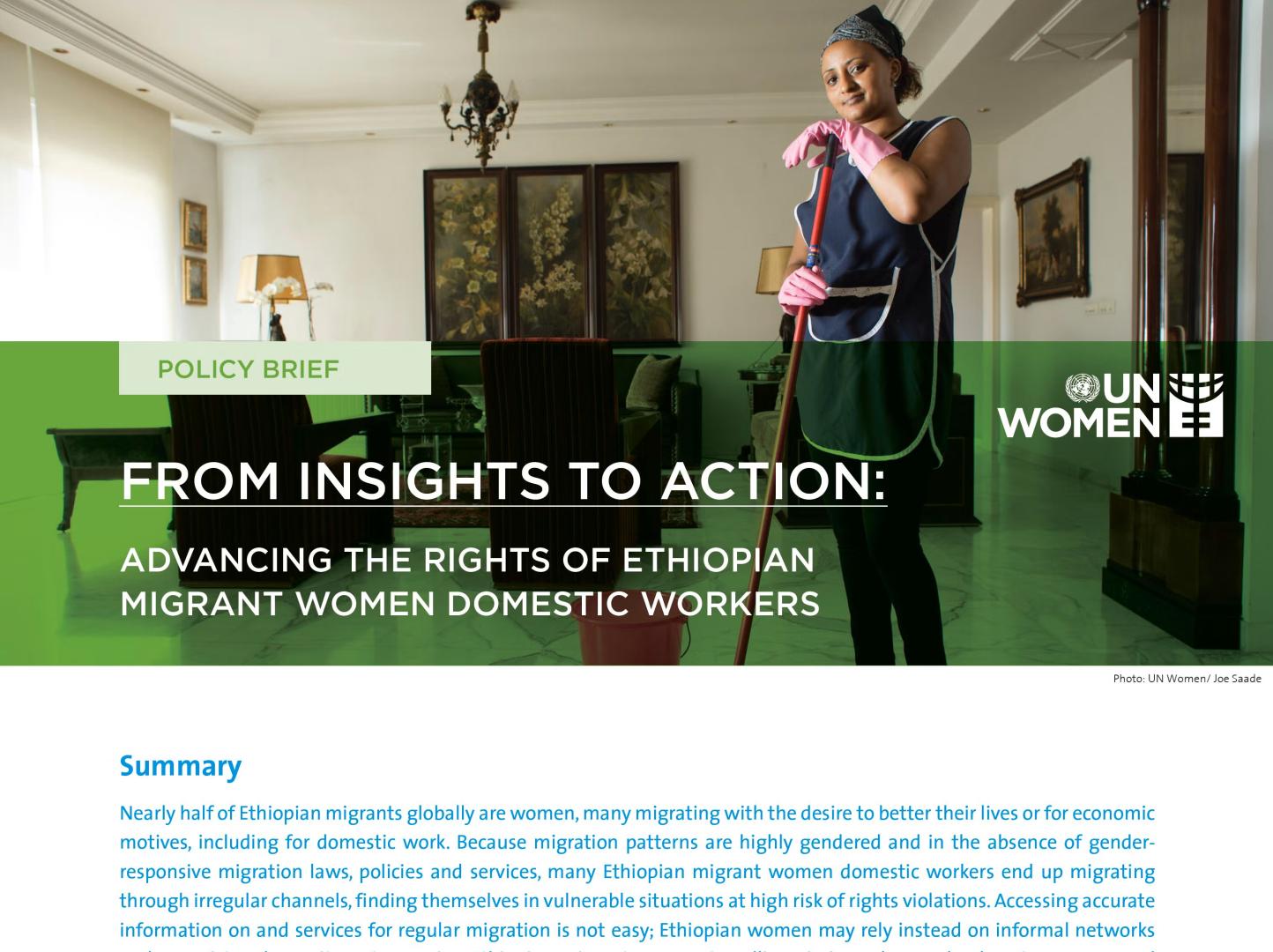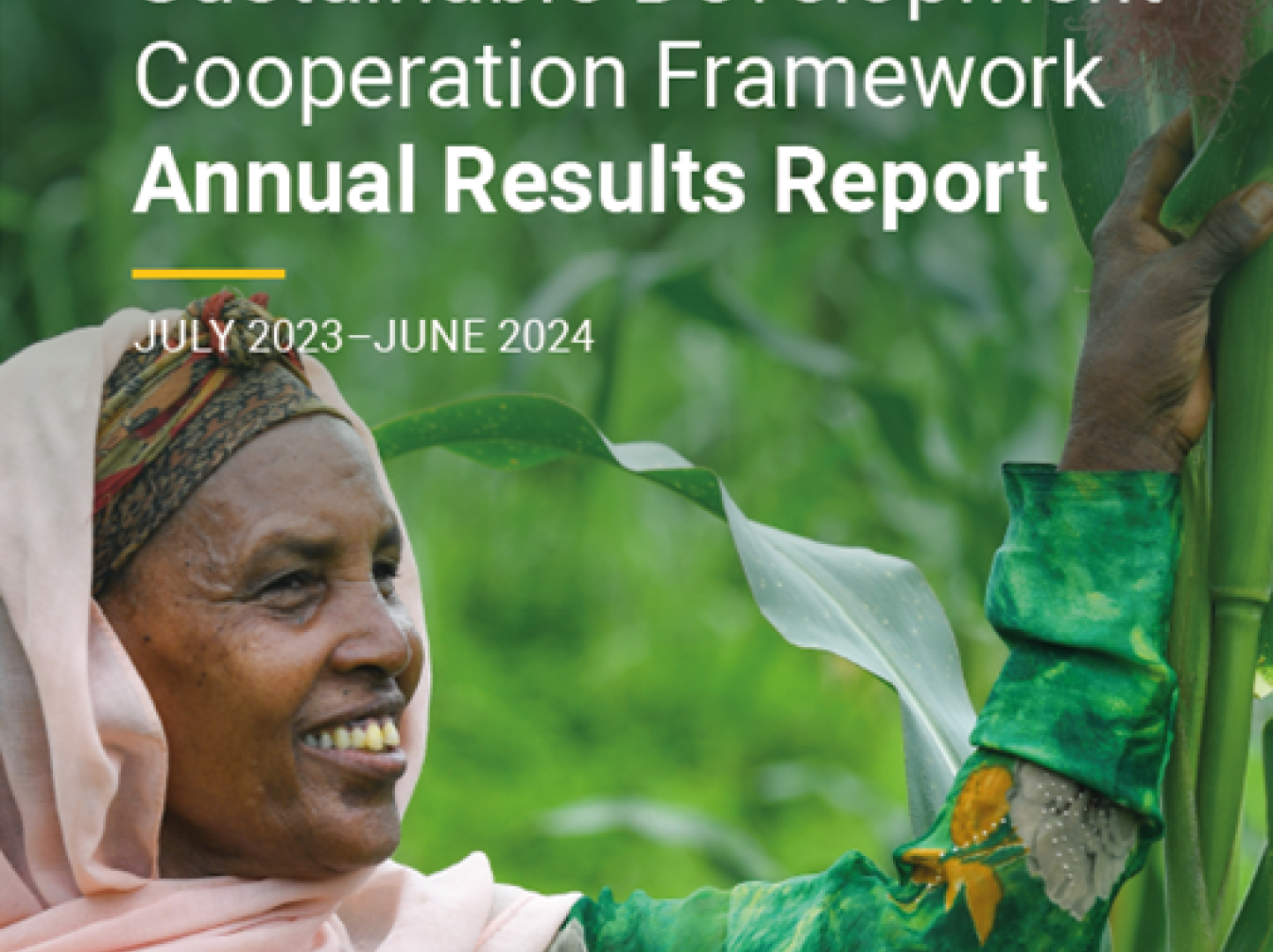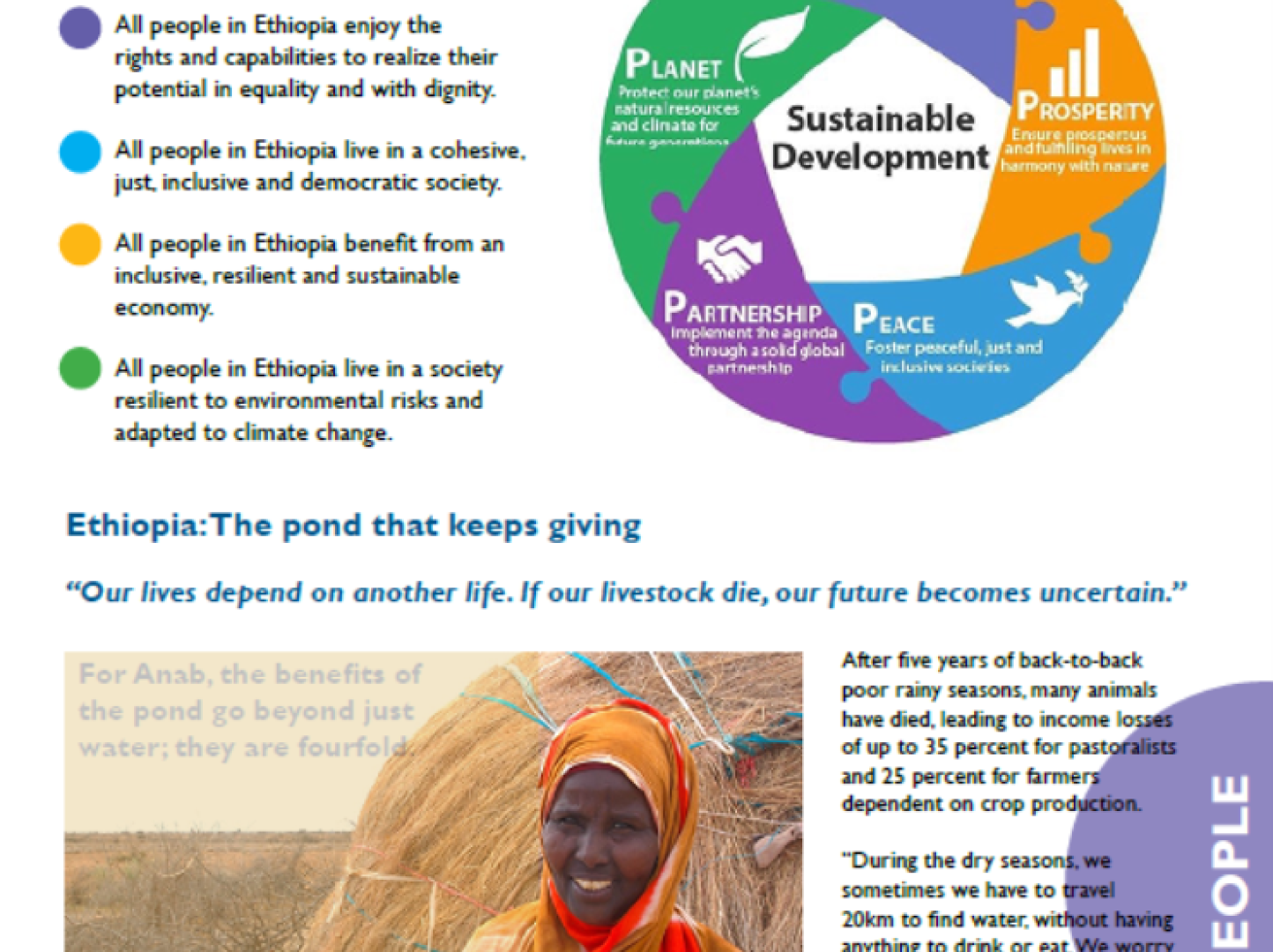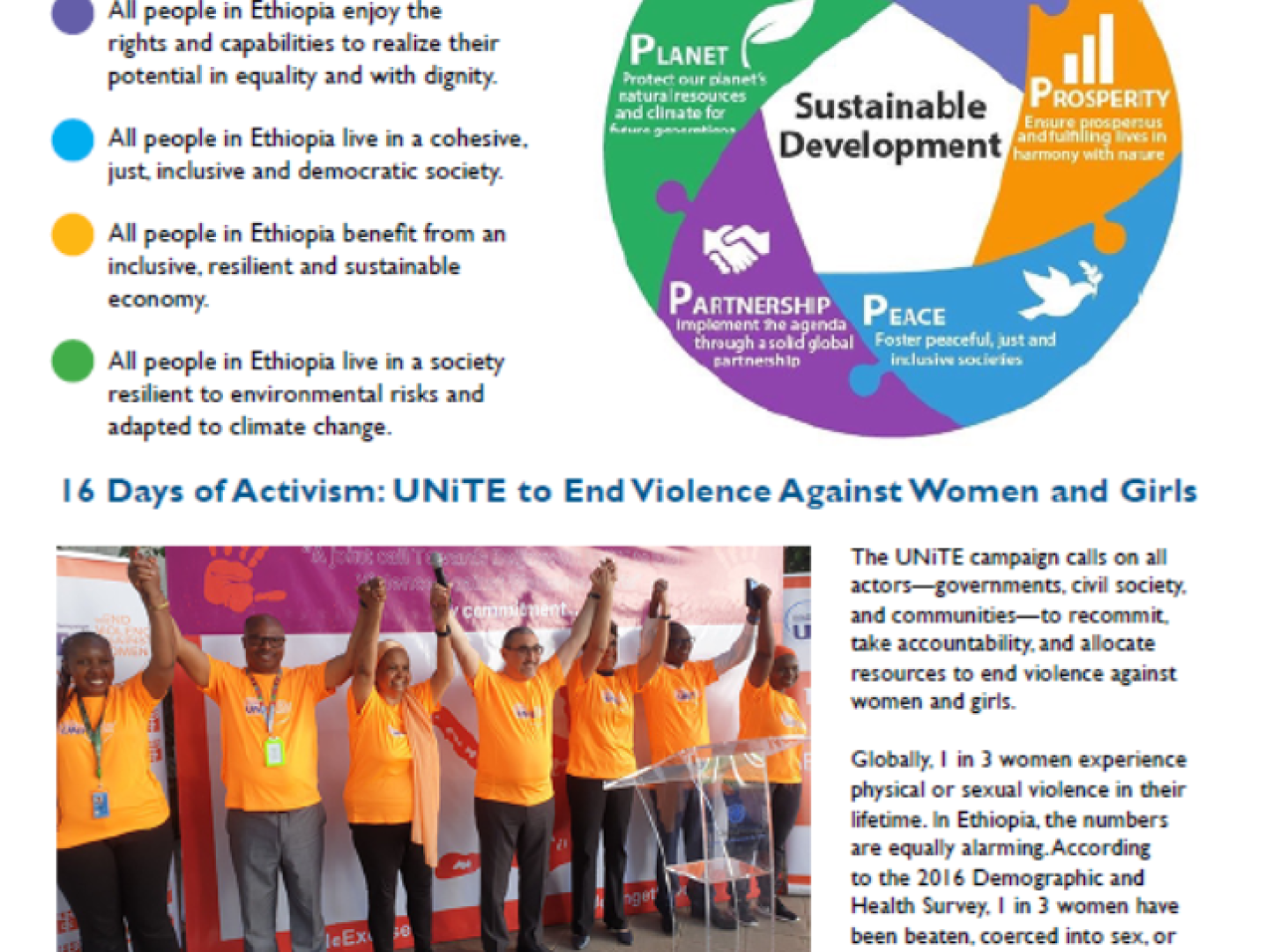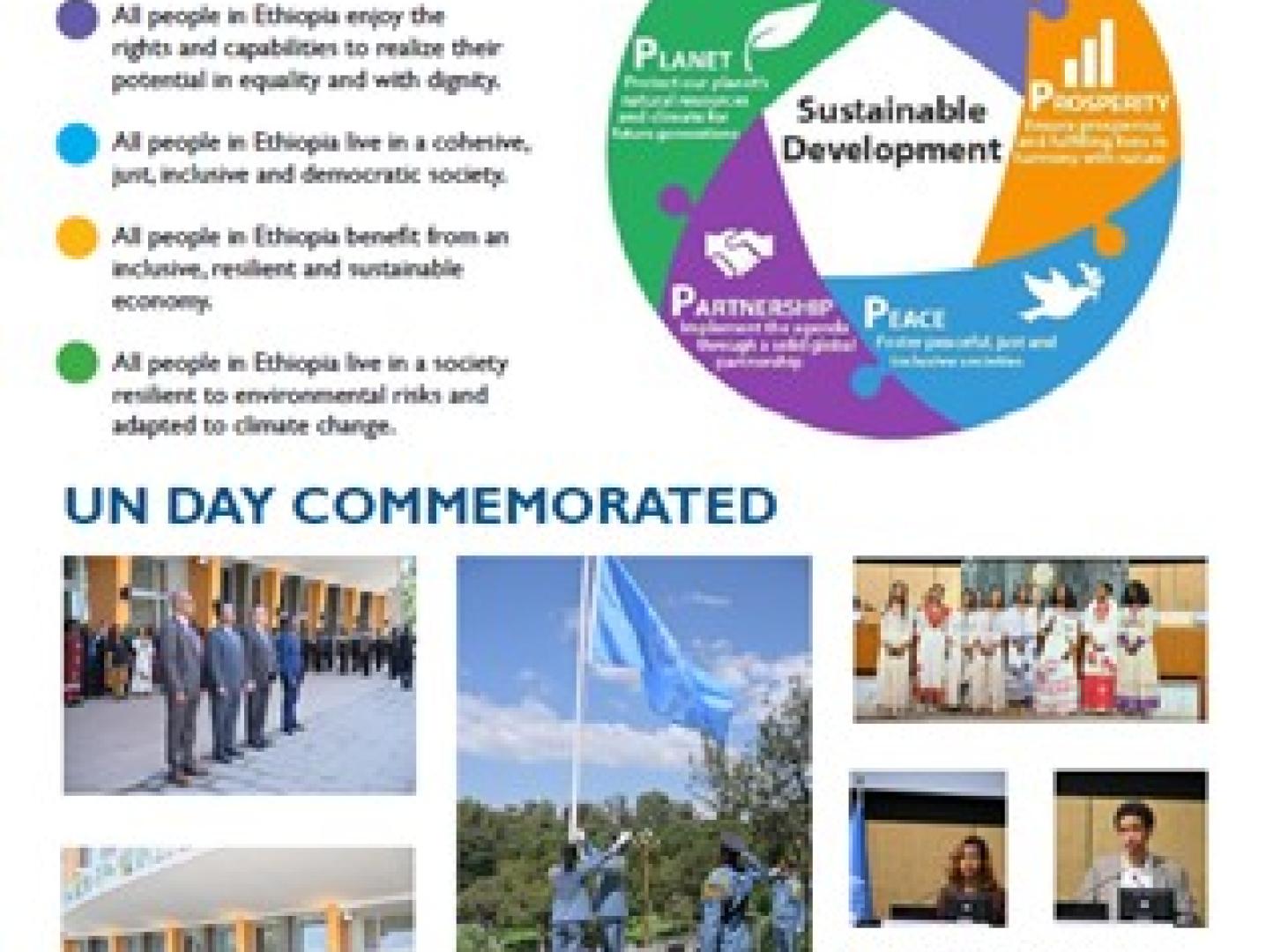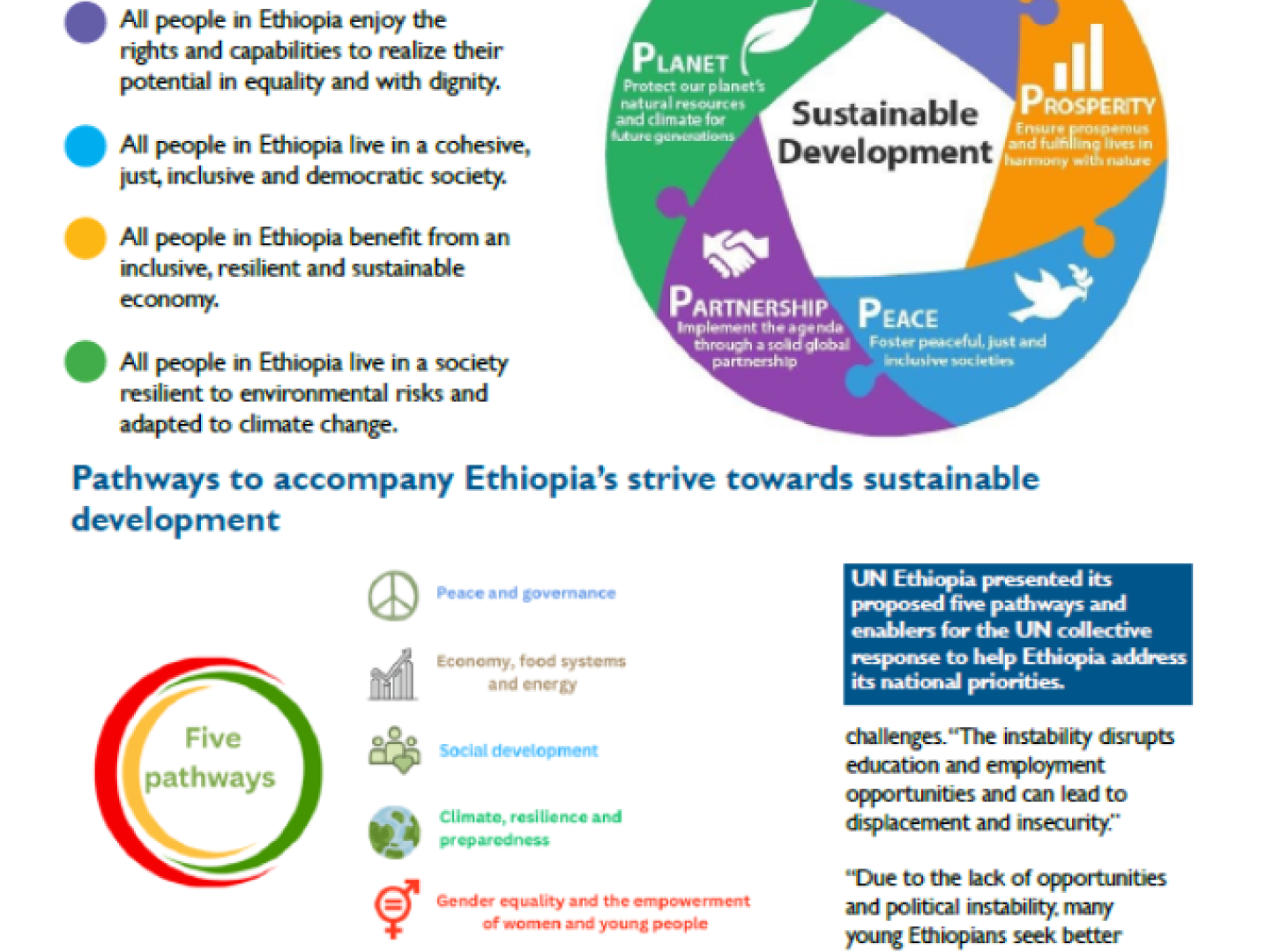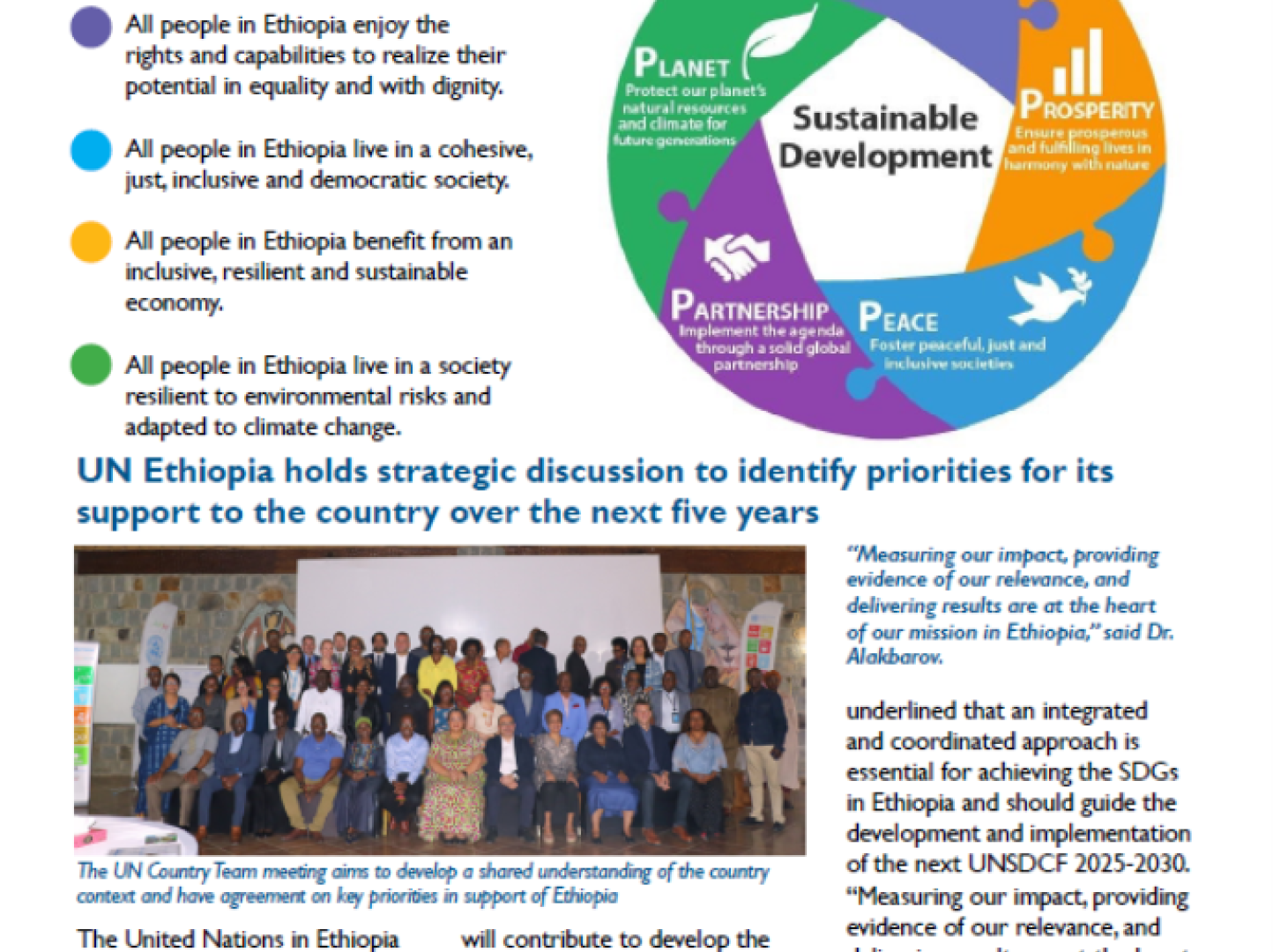Latest
The Sustainable Development Goals in Ethiopia
The Sustainable Development Goals are a call for action by all countries – poor, rich and middle-income – to promote prosperity while protecting the planet. They recognize that ending poverty must go hand-in-hand with strategies that build economic growth and address a range of social needs including education, health, social protection, and job opportunities, while tackling climate change and environmental protection.
These are the goals the UN is working on in Ethiopia:
Story
29 October 2025
Daycare facility opens in Ethiopia with the support of the ILO
The International Labour Organization (ILO), in partnership with Ethiopia’s Ministry of Industry, Kaliti Food Share Company (CEREALIA), Partnership for Change (PfC), and development partners from Germany and Norway, has inaugurated a model on-site workplace childcare facility at CEREALIA in Addis Ababa, Ethiopia. Established under the ILO’s ProAgro Ethiopia and Promoting Workers’ Rights and Gender Equality at Work in Africa– Phase II projects, the initiative aims to demonstrate how care-responsive workplaces can advance gender equality, improve enterprise productivity, and support decent work in Ethiopia’s agro-processing sector.Addis Ababa, ETHIOPIA (ILO News) – The International Labour Organization (ILO) opens a new on-site workplace childcare facility at the Kaliti Food Share Company (CEREALIA)in Addis Ababa, Ethiopia on 28 October 2025, on the eve of the UN International Day of Care and Support. The facility is the result of a strong public-private partnership involving the ILO, the Ministry of Industry, CEREALIA and Partnership for Change (PfC). It was established under the ILO’s ProAgro Ethiopia project and the Promoting Workers’ Rights and Gender Equality at Work in Africa-Phase II Project with the support from the German Federal Ministry for Economic Cooperation and Development (BMZ) and the Norwegian Agency for Development Cooperation (NORAD).Speaking at the inauguration, Khumbula Ndaba, Country Director for the ILO Country Office for Ethiopia, Djibouti, Somalia, South Sudan, and Sudan, and Special Representative to the AU and ECA, urged the private sector to prioritize the well-being of its workforce, especially women.Speaking at the inauguration, Khumbula Ndaba, Country Director for the ILO Country Office for Ethiopia, Djibouti, Somalia, South Sudan, and Sudan, and Special Representative to the AU and ECA, urged the private sector to prioritize the well-being of its workforce, especially women. “For working parents, especially mothers, care at work means reduced stress, the profound peace of mind that comes from knowing their children are safe and nurtured nearby, and a genuine chance to balance family responsibilities with professional ambitions,” Ndaba stated. He added, “Today, we are not just opening a room with toys; we are activating a powerful engine for social justice and gender equality.” The sentiment was echoed by Dawit Moges (Ph.D), First Vice President of Confederation of Employers Association (CEEA), who emphasized, "Care at work is not a cost, it is an investment in productivity". Underscoring the mutual benefit of the facility, Dawit stated, "When we care for the people who work for us, they care for the work that sustain us". Dawit Tamrat, CEO of Cerealia, pledged maximum ownership of the facility and expressed motivation to showcase it for replication in other industries along their supply chains. The facility's implementation was supported by PfC, an NGO that underscores the importance of access to quality childcare and early childhood care and education (ECCE) for advancing gender equality. Through this collaboration, PfC is now bringing its expertise into the private sector. Anthony Agyenta, Project Manager, ILO ProAgro Ethiopua, stated, "The initiative to responds to a critical need in Ethiopia's agro-processing sector, where women represent nearly 65% of the workforce. Many have been compelled to accept art-time or temporary employment due to the lack of accessible childcare".This initiative reflects the ILO’s ongoing commitment to link care and gender equality with enterprise development. The CEREALIA’s daycare stands as a model of good practice, reinforcing the ILO’s support for integrating care-responsive workplace policies into collective agreements and enterprise operations. About the projects The LO ProAgro Project, funded by the Special Initiative on Training and Job Creation of Germany’s Federal Ministry for Economic Cooperation and Development (BMZ), aims to promote job creation, labour formalization, and enterprise development in Ethiopia’s agricultural and agro-processing sectors. As part of its interventions, the project has been implementing the ILO Sustaining Competitive and Responsible Enterprises (SCORE) program in collaboration with its implementing partner, the Kaizen Excellence Center for the last two years. Through this initiative, 60 agro-processing companies including CERALIA and have enhanced their productivity, workplace standardization, cooperation, and Occupational Safety and Health (OSH) practices. The ILO ProAgro and the Workers’ Right and Gender Equality at work project jointly support the establishment of the childcare center at workplace at CERALIA. The ILO project, Promoting Workers’ Rights and Gender Equality at Work in Africa-Phase II, is funded by NORAD to enhance workers' rights and gender equality in Ethiopia, focusing Focused on Ethiopia's garment, agriculture, and domestic work sectors. A key objective of the project is to enhance gender equality at work by building the capacities of ILO constituents to promote workers' rights, particularly for those with family responsibilities, through improved maternity protection, paternity and parental leave, and childcare solutions. The project also delivers awareness-raising sessions to strengthen understanding of Equality at Work initiatives at both local and national levels on relevant gender-related International Labour Standards.
1 of 5

Story
24 October 2025
Ethiopia Marks UN 80th Anniversary
Ethiopia Marks the UN’s 80th Anniversary with a series of events that brought together UN staff, government representatives, diplomats, development partners, the African Union, youth, and other stakeholders.As one of the founding members of the United Nations, Ethiopia signed the UN Charter in 1945 and has since played a significant role in shaping multilateral cooperation.Held at the historic Africa Hall under the theme “Ethiopia and the United Nations: Past, Present and Future,” the commemoration served as a platform to reflect on eight decades of partnership and to strengthen dialogue on future collaboration to address current and emerging global and national challenges. “This celebration represents both a moment of reflection and renewal,” said Mr. Claver Gatete, Executive Secretary of the UN Economic Commission for Africa (ECA). Highlighting the historic significance of the venue, he referred to Africa Hall as “the home of African multilateralism” and the proud seat of ECA for over sixty years. The programme featured a flag-raising ceremony, a high-level panel discussion, and the launch of a timeline exhibition titled “Ethiopia and the UN Through the Decades.”Speaking at the event, Ambassador Berhanu Tsegaye, State Minister at the Ministry of Foreign Affairs of Ethiopia, reaffirmed Ethiopia’s enduring role as a founding member of the UN and its strong support for a multilateral system anchored in the UN Charter.“Eighty years of the UN is a milestone, but it is also a mandate to do better — with equity, reform, and respect for sovereignty,” he said, calling for stronger efforts toward peace, development, and justice in a rapidly changing world.The Chairperson of the African Union Commission, Mahmoud Ali Youssouf, emphasized the close partnership between the AU and the UN, describing them as sister institutions united by shared values and commitments to Agenda 2063 and Agenda 2030. He called for collective action to confront escalating global challenges. During a high-level panel that convened representatives from the UN, Government, African Union, development partners, and youth, the UN Resident and Humanitarian Coordinator (a.i.), Dr. Aboubacar Kampo, emphasized Ethiopia’s leadership role in the UN’s history.“As one of the founding members of the United Nations, Ethiopia’s voice helped shape the principles of peace, cooperation, and human dignity that remain at the core of the UN Charter.”He underscored that while the world faces complex challenges — from climate change to inequality and conflict — it is also a moment of opportunity to reimagine collective action. He reaffirmed the UN Country Team’s commitment to supporting Ethiopia through the UN Sustainable Development Cooperation Framework (2025–2030).Participants highlighted the importance of deepening cooperation to advance peace, sustainable development, and intergenerational justice. The Timeline Exhibition chronicled key milestones in the UN-Ethiopia partnership — a journey marked by solidarity, progress, and shared aspirations since 1945.The commemoration also provided a platform for Ethiopian university students to showcase innovative SDG-focused solutions and for young people to perform peace-themed songs and share messages affirming the continued relevance of the United Nations for all — everywhere and everyone.
1 of 5

Story
12 October 2025
Business skills open doors: Amin’s journey from graduate to entrepreneur
When Amin Abdiweli Ibrahim, graduated with a degree in Chemical Engineering from Addis Ababa Science and Technology University in 2022, he had more than a diploma—he had a vision. Passionate about creating something of his own, Amin returned to his hometown of Jigjiga in Ethiopia’s Somali Region and teamed up with two fellow graduates from Jigjiga University to start a small-scale shampoo and detergent business.With only a modest shade for a workshop and support from their families, they launched Siraaj Shampo and Detergents, determined to turn their skills into sustainable income. But while the team had technical knowledge and ambition, they lacked the business and financial know-how to scale their operation.That’s when the Business Plan Competition (BPC) became a game-changer. Organized by the ILO and HASI Consulting, it is a platform for aspiring youth entrepreneurs to develop business ideas that can be transformed into sustainable businessesAmin and his partners joined BPC, immersing themselves in the training sessions offered: Start and Improve Your Business (SIYB), Gender and Entrepreneurship Together (GET Ahead) and Financial Education. These sessions weren’t just theoretical - they were practical lessons in building a sustainable business.The BPC was not just a competition. It was an empowerment program that gave us the tools to grow, and the belief that we could do itBeyond the training, the mentorship from the Business Development Service Providers Association (BDSPA) helped them refine their business plan and develop confidence in financial management—skills they’d never formally learned before.Amin and his colleagues were among the 50 candidates to successfully win the BPC. The grant prize from the BPC provided allowed them to invest in essential equipment like additional reservoirs and office furniture, as well as raw materials. Armed with their new knowledge, Amin and his team prepared a compelling loan proposal. Their efforts paid off. Shabelle Bank approved a loan of USD 8,000, giving them the capital needed to expand operations."The training we received on business proposal preparation through the BPC was instrumental in securing the loan from Shabelle Bank. It gave us the knowledge to present our vision in a way that financial institutions could understand and trust", said Amin.With the funding, Siraaj Shampoo and Detergents constructed a new production facility, acquired modern machinery, and increased their raw material stock. As a result, monthly production skyrocketed from 3,000 to 12,500 litres—a fourfold increase. The business now supplies products across the Somali Region, bringing them closer to their dream of becoming a household name.Now a confident entrepreneur and employer, Amin is urging others to follow in his footsteps."I encourage young people to focus on becoming employers rather than employees. It's one of the most effective ways to transform their lives."Written by: Zelalem Alemenew Desta
1 of 5

Story
12 October 2025
ILO Women Leadership Development Programme transforms careers in Ethiopia’s garment and textile sector
Through targeted training and mentorship, the programme has seen remarkable success, 70% of its trainees have been promoted. By building confidence of women workers, improving kills, and opening doors to new opportunities, the initiative is not only advancing careers but also reshaping the future of workplace equality in the industry. Hawassa, Ethiopia (ILO News) – A growing number of women in Ethiopia’s garment sector are moving from operational roles to leadership positions, thanks to ILO/IFC Better Work’s Women Leadership Development Programme (WLDP). Since its launch in 2021, the programme has trained over 234 women, with an average of 70% promoted to supervisory roles, a milestone that marks significant progress in promoting workplace equality and inclusive industrial growth. In addition, our of 178 senior supervisors who served as mentors, 10 were promoted to middle-level leadership positions.The programme’s holistic approach, combining classroom learning, practical exercises, and sustained mentorship, is helping women workers move from factory floor roles to leadership positions across Ethiopia’s industrial parks. Participating factories have seen improved line efficiency, higher product quality, and absenteeism, while women workers have developed critical skills in decision-making, conflict resolution, communication, influencing, problem solving skills and planning skills.At JP Garment, Azeb Abraham, an Industrial Engineering Executive, described how the programme accelerated her professional growth:“Before the training, I struggled with communication and lacked self-confidence. After completing the ILO’s Leadership and Technical Skills training, I now take the lead, communicate clearly, and lead my team with confidence,” said Azeb. “As a mentor, I coached three women workers, and one of them was promoted from jumper to line supervisor, an achievement that improved her career and salary. This training doesn't just change your work life; it transforms your personal life too.”Since its launch in 2021, the programme has trained over 234 women, with an average of 70% promoted to supervisory rolesAt Indochine Garment, Mekdes Alamu shared a similar experience:“The Leadership and Technical Skills training helped me sharpen my production skills, minimize product waste, improve my punctuality, and operate multiple machines,” said Mekdes. “It’s not just about technical growth, the training improved my communication skills, teamwork, and confidence. I hope more workers get this opportunity.”In addition to trained women workers, mentors are central to the success of WLDP. Firew Eshetu, an IE Executive at Indochine Garment, reflected on his experience coaching women workers:“Before the training, I viewed my job simply as a means of income. But through the ILO’s training, I discovered my ability to lead and support others, enhanced my communication, time management, and problem-solving skills. said Firew. “Mentoring helped me grow personally and professionally. I believe expanding this training would significantly boost productivity and employee’s satisfaction.”Coordinating the programme’s fourth round at Indochine Garment, Health and Safety Executive Aster Kebede noted the wide-ranging impact:“The training and mentorship approach empowered participants to grow in their careers and personal development”, said Aster. “It’s a rewarding experience to see mentees progress, and coordinating the programme helped identify my own areas for improvement and strengthen my skills.”A Pipeline for Inclusive LeadershipThe WLDP was launched as a flagship component of the ILO’s Better Work Ethiopia programme, which promoted better jobs and more equitable workplaces in Ethiopia’s industrial parks and concluded in May 2025. In addition to training women workers, the initiative builds factory-level coaching and mentorship by training mentors, often senior supervisors and HR professionals, who provide ongoing guidance and foster a culture of inclusive leadership.Building on this momentum, the Programme is now preparing to launch a Women Leaders Network in Hawassa and Addis Ababa. The network will connect graduates of the WLDP across Hawassa and Bole Lemi Industrial Parks in both cities, creating a dynamic platform to: foster mentorship and peer learning; elevate the visibility of women leaders; promote collaboration across factories and support women’s career advancement and leadership growth. This exciting initiative marks another significant step toward empowering women and strengthening inclusive leadership across Ethiopia’s industrial landscape.The programme’s reach is also expanding beyond the garment sector. It has recently extended into horticulture and partnered with the Ministry of Industry to roll out similar Women Leadership Development Programme in eight additional enterprises, seven of which are women-owned. This expansion highlights the programme’s adaptability and relevance across Ethiopia’s broader industrial development.Measurable Impact, Growing Demand“The impact of the WLDP is both measurable and deeply personal,” said Tigist Fisseha, Team Leader, ILO Better Work Ethiopia. We are not only increasing productivity on the factory floor but helping women unlock their full leadership potential—transforming lives, workplaces, and communities.As the fifth round of training unfolds, and with preparations for the Women Leaders Network underway, the WLDP continues to demonstrate how targeted skills development, mentorship, and inclusive practices can empower women and accelerate Ethiopia’s industrial transformation—one leader at a time.The programme promoted better jobs and more equitable workplaces in Ethiopia’s industrial parks About the Programme: The ILO’s Better Work program in Ethiopia aims to improve labour standards and competitiveness in the garment and textile industry. Launched in partnership with the International Finance Corporation (IFC), it supports factory compliance with labour laws and international labour standards. The program provides training and advisory services to employers and workers. It also fosters dialogue among stakeholders, including government, employers, and trade unions. Ultimately, it seeks to promote decent work and sustainable economic growth in Ethiopia’s growing industrial sector.
1 of 5

Story
12 October 2025
Ethiopia Launches “LeMengede” Mobile App to Empower and Protect Migrant Workers
The Ministry of Labour and Skills (MoLS), in collaboration with the International Labour Organization (ILO) under the Better Regional Migration Management (BRMM) Programme, launched the LeMengede (ለመንገዴ) mobile application at an event held at the Hyatt Regency Hotel in Addis Ababa. The app is designed to provide Ethiopian migrant workers with access to essential information and support services throughout the migration process.The launch was attended by representatives from government institutions, social partners, international organizations, diplomatic missions, civil society groups, and returnee migrants. The discussions highlighted ongoing efforts to improve protection for Ethiopian migrant domestic workers, with a particular focus on addressing challenges faced by women working in less regulated sectors abroad.The LeMengede app, developed with technical support from the ILO and funding from the UK’s Foreign, Commonwealth and Development Office (FCDO), offers multilingual information on safe migration, rights awareness, complaint-handling mechanisms, and an emergency SOS feature. It serves as a practical digital companion for migrant workers, before departure, while abroad, and upon return.The launch was inaugurated by Mr. Khumbula Ndaba, ILO Country Director for Ethiopia, Djibouti, Somalia, Sudan, and South Sudan, and H.E. Ms. Nebiha Mohammed, State Minister, Ministry of Labour and Skills. In his keynote address, Mr. Ndaba highlighted the ILO’s longstanding commitment to promoting decent work for all, particularly in migration corridors where risks are most pronounced. He reaffirmed the ILO’s support to the Government of Ethiopia in strengthening fair recruitment, data-driven migration governance, and the integration of digital tools such as LeMengede into national systems.H.E. Ms. Nebiha Mohammed emphasized the government’s dedication to addressing the root causes of irregular migration and enhancing protection mechanisms for migrant workers. She commended the collaboration with ILO and other stakeholders in developing the app, which she described as a “critical leap forward in bridging information gaps and reinforcing worker protections.”Following the opening, a short video demo and live walk-through of the app showcased its core features, from SOS alerts to QR-code-based user identification. MoLS representatives provided insight into how the app links to the broader Labour Market Information System (E-LMIS) and supports the country’s overseas employment governance.A technical presentation by the ILO highlighted Ethiopia’s progress under the BRMM programme, including reforms in recruitment practices, capacity building, and the digitization of labour migration data systems.The highlight of the event was a panel discussion that brought together perspectives from government institutions, the private sector, and returnee migrants. The discussion focused on how digital tools like the LeMengede app can improve migration governance, promote transparency in the recruitment process, and strengthen protection mechanisms for migrant workers. Panellists discussed the importance of integrating such tools into pre-departure training, ensuring alignment with fair recruitment standards, and drawing from regional experiences to enhance coordination. The session also highlighted the value of practical, accessible information for migrants and the need for continued collaboration to make digital solutions more responsive to the realities faced by workers, both before departure and while abroad.The event concluded with a call for continued collaboration among stakeholders to expand awareness and ensure the LeMengede app is effectively integrated into Ethiopia’s broader migration governance framework. Participants emphasized the need to strengthen outreach efforts and encouraged institutions to actively promote the app within their respective communities so it can reach and serve the migrant workers who need it most.Written by: Yonas Zewdie
1 of 5

Press Release
20 October 2025
Rebuilding Hope: Shewate Hugum Primary School Restores Learning for Children in Conflict-Affected Abergele District
In a move to restore vital community infrastructure, the Shewate Hugum Primary School in Abergele Woreda has been successfully constructed and officially handed over to the regional authorities. The handover ceremonies, held on October 12, 2025, mark the completion of rehabilitation works carried out under the Response-Recovery-Resilience for Conflict-Affected Communities in Ethiopia (3R4CACE) Project, financed by the World Bank and implemented by UNOPS. This effort underscores a continued commitment to reestablishing essential education and health services for residents affected by conflict. The comprehensive infrastructure project features two academic blocks housing eight spacious classrooms, each capable of accommodating 50 students. The school compound also includes a dedicated administration block, three hybrid toilet buildings with septic systems, a reliable water supply, and a full electrical system. External works such as perimeter fencing, gated access, walkways, and landscaping create a secure and conducive learning environment.This intervention directly addresses a critical gap in the community. During the recent conflict, the area's educational infrastructure was severely compromised, leaving children without a place to learn. The new Shewate Hugum Primary School was constructed on a new site to specifically serve these children, who previously had no accessible school to attend. The handover of this facility marks a pivotal change. The school is now equipped to enroll 852 students, dramatically increasing educational access. Furthermore, the design incorporates accessible and inclusive facilities, ensuring that disabled students can fully participate in school life. The project has also provided essential furniture, including school desks and blackboards, to ensure the classrooms are fully functional from day one.Gezawi Teklay, Head of the Woreda Education Office, said: "Before this, our children were at home. Now they have a future. This school is not just buildings; it is the heart of our community, rebuilt."The newly operational school will be supported by a target staff of 25 teachers and administrative personnel, who are ready to provide quality education within this new, resilient infrastructure.
1 of 5
Press Release
07 October 2025
UNOPS Hands Over Surveying Drones to Support Smart Farming in Ethiopia
The handover ceremony took place on October 7, 2025 in the presence of His Excellency Dr. Abraham Belay, Minister of Irrigation and Lowlands.The drones are designed to bring practical solutions to farmers and communities across Ethiopia. With their advanced sensors, they can estimate crop yields even before harvest, giving farmers a clearer picture of what to expect and how to plan ahead. They can also monitor crop health, spotting early signs of pests or disease that might otherwise go unnoticed until too late. In irrigation and soil management, the drones help prevent common challenges like water loss, fertilizer waste, or equipment failures that can damage plants and reduce harvests. The high-quality images they capture can also be transformed into vegetation maps, helping experts and farmers make better decisions about land use and crop rotation. Beyond crops, the technology supports the wider rural environment: it can aid forestry and wetland management, and even allow farmers to remotely check on their cattle, ensuring that livestock have safe grazing areas and access to water. Together, these applications make farming more efficient, sustainable, and resilient helping farmers protect their livelihoods and secure food for their communities.Speaking at the event, Ms Worknesh Mekonnen, UNOPS Director, Horn of Africa Multi Country Office and Djibouti and Representative to the AU, said: “These drones will give the Ministry of Irrigation & Lowlands powerful tools to better serve farmers across Ethiopia. By helping the Ministry monitor crops, water use, and livestock more effectively, the drones will support smarter decisions that directly benefit rural communities. Our partnership is about providing the Ministry with the necessary support in key areas, enabling it to play a stronger role in advancing Ethiopia’s national strategy for enhanced productivity, food security, and sustainable development."Press contact details:Meron Aberra, Communication Specialist E-mail merons@unops.org | Mobile: +251-911 221060 www.unops.org/ethiopia Twitter/X: @UNOPS_HoAAbout UNOPSUNOPS offers practical solutions across peace and security, humanitarian and development operations. We help the United Nations, governments and other partners to manage projects, and deliver sustainable infrastructure and procurement in an efficient way. Read more: www.unops.org.
1 of 5
Press Release
20 June 2025
Ethiopia and United Nations Sign New Cooperation Framework
The Government of Ethiopia and the United Nations in Ethiopia have officially signed the United Nations Sustainable Development Cooperation Framework (UNSDCF) for the period 2025 to 2030, signaling a renewed partnership aimed at advancing Ethiopia’s development priorities and achieving the Sustainable Development Goals (SDGs).The signing ceremony took place at the Ministry of Finance and was attended by Her Excellency Semereta Sewasew, State Minister of Finance of Ethiopia, and Dr. Ramiz Alakbarov, UN Assistant Secretary-General and UN Resident and Humanitarian Coordinator for Ethiopia. The event was further attended by Heads of UN agencies operating in Ethiopia, emphasizing the strong collaborative effort to support the country’s development agenda.The new Cooperation Framework aims to address Ethiopia’s most urgent challenges through a comprehensive approach that promotes resilience, inclusivity, and sustainable growth by strengthening resilience to climate change and economic shocks, building sustainable food systems and improving livelihoods—particularly in rural areas—creating job opportunities with a focus on empowering youth and women, modernizing development programs through digital transformation, and providing targeted support to vulnerable populations such as women, children, and persons with disabilities.This framework is developed through an inclusive, participatory process aligned with Ethiopia’s Ten-Year Development Plan and the Home-Grown Economic Reform Agenda 2.0. It also reflects Ethiopia’s commitment to the global 2030 Agenda for Sustainable Development, emphasizing self-reliance, peace, and stability. The UNSDCF is organized around five strategic pillars—Peace and Good Governance; Economic Development, Food Security, and Energy; Social Services, Education, and Protection; Environmental Sustainability, Climate Resilience, and Disaster Preparedness; and Gender Equality and Youth Empowerment—that will guide interventions over the next five years, with the aim of complementing and strengthening Ethiopia’s ongoing efforts toward sustainable and inclusive development.An estimated US$6.5 billion is required to implement the framework fully over five years. Currently, approximately US$1.5 billion has been mobilized, leaving a funding gap of US$5 billion. Addressing this gap will be critical for realizing the framework’s objectives and ensuring impactful results.Ethiopia hosts one of the largest United Nations Country Teams (UNCT) globally, comprising about 28 UN agencies based in Addis Ababa. To enhance coordination and maximize impact, the framework introduces strengthened mechanisms, including empowered Results Groups responsible for integrated planning, monitoring, and reporting. These measures are designed to improve coherence and efficiency across UN interventions.“The new Cooperation Framework embodies our shared vision and trust in Ethiopia’s reform journey,” said Her Excellency Semereta Sewasew. “It sets a strong foundation for transformative progress, and I urge all UN agencies to fully implement the coordination mechanisms outlined, as this is essential for maximizing our collective impact.”Dr. Ramiz Alakbarov emphasized, “This Framework reflects the strength of our partnership with Ethiopia. Through joint efforts, we aim to build resilient systems, empower women and youth, and develop sustainable solutions so that no one is left behind. The UN is committed to leveraging its expertise and partnerships to support Ethiopia’s development priorities and accelerate progress toward the SDGs.”The UNSDCF is scheduled to commence in July 2025, with the Government of Ethiopia reaffirming its commitment to its effective implementation. The partnership aims to deliver measurable progress in Ethiopia’s journey toward a peaceful, prosperous, and resilient nation.
1 of 5
Press Release
10 April 2025
UNOPS Executive Director to visit Ethiopia, Somalia and Sudan
Jorge Moreira da Silva, UN Under-Secretary-General and UNOPS Executive Director, is scheduled to visit the Africa region, in a five-day visit that will take him to Ethiopia, Somalia and Sudan. During his visit, Mr. Moreira da Silva will meet national authorities and development partners. He will discuss the practical solutions that UNOPS offer to partners to maximize the impact of their humanitarian, development and peace operations ―all in support of the Sustainable Development Goals.The visit also aims at getting a better understanding of the needs on the ground, and how UNOPS can scale operations to respond.UNOPS ongoing support in the region includes: In Sudan, where half of the population ―some 25 million people― need humanitarian assistance and protection, UNOPS is strengthening health infrastructure, improving access to clean, safe water, supporting peacekeeping operations to protect civilians, and facilitating a more sustainable and equitable use of natural resources. In Somalia, UNOPS works to strengthen the capacity of Somali institutions and supports partners in a range of sectors, such as health, governance, peace and security. We work to support reconstruction and state-building through disaster preparedness planning, crisis recovery, climate-resilient infrastructure and strengthening of the security sector.In Ethiopia, UNOPS works with partners to support national and international development priorities. Over the years, with our partners, we have helped strengthen health and education systems and supported food security. This includes environmentally friendly solutions and innovative models to modernize Ethiopia’s agriculture sector, provide clean energy to off-grid areas and improve health services across the country.ENDSPress contact details:For media requests, please contact Taraneh Dadar <taranehd@unops.org> or Luis Piselli <luispi@unops.org>About UNOPSUNOPS offers practical solutions across peace and security, humanitarian and development operations. We help the United Nations, governments and other partners, such as the European Union and its Member States, to manage projects, and deliver sustainable infrastructure and procurement across the world. Read more: www.unops.org.
1 of 5
Press Release
09 April 2025
Restoring Hope: Health and Education Facilities Rebuilt in Asgede Woreda, Tigray
Tigray, Ethiopia, April 2025 – In a significant step towards rebuilding essential public services in conflict-affected areas, the Edaga Hibret Health Centre and May Hanse Primary School in Asgede Woreda, Tigray, have been successfully rehabilitated and officially handed over on April 8 and 9, 2025 respectively. These projects were part of the Response-Recovery-Resilience for Conflict-Affected Communities in Ethiopia (3R4CACE) Project, financed by the World Bank and implemented by UNOPS, demonstrating a commitment to restoring critical health and education services for the community.The conflict had left both the health centre and the school severely damaged, disrupting access to healthcare and education for thousands. Through these reconstruction efforts, the Government of Ethiopia and its partners have worked to rebuild resilient infrastructure that now serves the needs of the local population. Healthcare at Edaga Hibret Health Centre - The Edaga Hibret Health Centre, which had previously suffered extensive damage—including the destruction of the outpatient department (OPD), pharmacy, and chemical storage areas has been rehabilitated to once again provide essential healthcare services. The newly improved facility now includes:A new pharmacy block to enhance medical supply storage and distributionA hybrid toilet building with a septic tank and soak-away pit for better sanitationA water supply system to improve hygiene standardsAn electrical system to ensure uninterrupted operationsExternal works, such as fencing, gates, walkways, and water points, creating a secure and accessible environmentWith these improvements, the health centre is now able to serve 20,000 patients, ensuring better access to quality healthcare, particularly for disabled individuals and vulnerable populations.Education at May Hanse Primary School - Similarly, May Hanse Primary School has been reconstructed to provide a safe and conducive learning environment for students who had previously been left without a functioning school. The recovery efforts included:Two new classroom blocks with six classrooms, each accommodating at least 50 studentsA hybrid toilet building with modern sanitation facilitiesA water supply system to support hygiene and daily school operationsAn electrical system for improved learning conditionsExternal works, including fencing, gates, walkways, and landscaping to enhance accessibility and securityAs a result, the school now accommodates 1,978 students, many of whom had no access to education due to the conflict. The school has targeted to employ 46 teachers, ensuring that students receive quality instruction. Additionally, blackboards have been procured, and desks are set to be delivered to fully equip the classrooms.The successful rehabilitation of the Edaga Hibret Health Centre and May Hanse Primary School stands as a testament to the dedication of the Ethiopian government, the World Bank, and UNOPS to restoring essential services and fostering resilience in conflict-affected regions.
1 of 5
Latest Resources
1 / 11
Resources
29 April 2025
Resources
29 April 2025
1 / 11




















